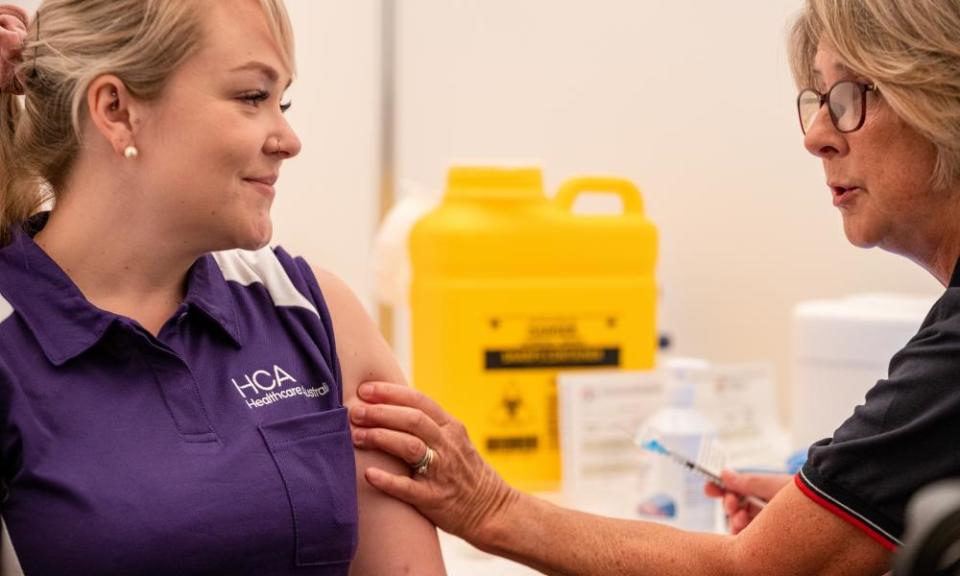Pfizer warns Australia a Covid vaccine patent waiver could harm supply and safety

Pfizer has warned Australia against joining a growing push to waive the intellectual property protections for Covid-19 vaccines, arguing it could actually harm vaccine supply and invite less safe copycats.
Pfizer Australia made the submission to a parliamentary inquiry into vaccine fraud, arguing that open-slather production could see scarce inputs snapped up making it harder to produce its vaccines, which form a large component of Australia’s rollout.
The inquiry has also received submissions from the home affairs and attorney general’s departments warning Australians could be subjected to phishing scams offering vaccines, a risk exacerbated by blood clot concerns with the AstraZeneca vaccine.
Australia has so far resisted calls for the World Trade Organization to waive patents on Covid-19 vaccines, which would allow more pharmaceutical companies to manufacture them in a bid to boost supply in developing countries.
Earlier in May, the United States reversed its long-held opposition, leaving Australia in the minority as more than 100 countries back the move, championed by India and South Africa.
Australia has proposed a compromise that would require poorer countries and those manufacturing the generic vaccines to pay for rights to formulas but has left the door open to a full waiver in the wake of the US repositioning.
Australia has been engaging constructively to find a proposed solution to the #TRIPSwaiver. We look forward to continuing to work with the US and others to find solutions that facilitate access to Covid-19 vaccines. https://t.co/imRlkNtPFV
— Dan Tehan (@DanTehanWannon) May 6, 2021
Pfizer submitted to the parliamentary joint committee on law enforcement that the proposed waiver “incorrectly portrays IP as a barrier to rapid innovation, R&D collaboration and access to Covid-19 vaccines and other products”.
Pfizer argued IP protections had encouraged an “unprecedented amount of innovation” and that removing them would “send the wrong message” to those looking for vaccines for the next pandemic.
It also claimed waiving patents “would not speed up vaccine production” but would have a counterproductive effect in the current pandemic “particularly if companies begin to buy up scarce inputs in the hopes of manufacturing a vaccine using technology developed by others”.
“Manufacturing of our vaccine involves the use of over 280 materials,” Pfizer said.
“These materials come from 86 suppliers in 19 different countries.
“If any one of the 280 different components from suppliers, however trivial, is not provided, we cannot manufacture or release the vaccine.”
“Greater demand pressures on inputs from new market entrants will make it harder, not easier, to manufacture Covid-19 vaccines in the near term.”
Related: Is Australia stopping the world’s poorest nations from accessing cheap Covid-19 vaccines?
Pfizer argued waiving patents “may invite copycat medicines from suppliers that lack the knowhow to manufacture vaccines safely”, which could expose patients to “unsafe products” and could “potentially undermine public confidence in vaccine safety”.
In April Australia’s vaccine program was thrown into disarray by a warning that the AstraZeneca vaccine may cause extremely rare but potentially deadly blood clots and is not the preferred vaccine for under-50s.
The Australian government responded by purchasing 20m extra doses of Pfizer, shifting the program away from its dependence on locally produced AstraZeneca.
Although there have been no delays on Pfizer imports so far, Australia is banking on 28m doses arriving in the final three months of the year, requiring a sprint to finish vaccinating the entire adult population by year’s end.
The home affairs department submitted to the inquiry that the threat of criminal groups seeking to exploit the vaccine rollout is “likely to be on a small scale or isolated incidents”.
But it said “fraud and scam activity driven by the release of the Covid-19 vaccine will be the most significant criminal issue associated with Covid-19 to impact Australia over the next 24 months”.
“Criminals will likely use vaccine-themed phishing campaigns and other scams to obtain personal identification information, which they may then exploit for future fraud.”
The attorney general’s department noted that counterfeit vaccines are already for sale on the internet, including the dark web, which could put the public at risk and reduce confidence in vaccines.
“The risk of counterfeit vaccines, such as fake Pfizer vaccines, is potentially exacerbated by concerns about the AstraZeneca vaccine,” it said.
The Australian Competition and Consumer Commission submitted from January to April 2021 its Scamwatch website had received 793 reports mentioning Covid-19 with $2.4m in reported losses. Only 58 of these related to Covid-19 vaccines, with no reported financial losses, it said.
The ACCC and attorney general’s department recommended clear public messaging around the vaccine rollout to counter scammers’ narratives, for example, that one must pay for the vaccine.
The ACCC said this should include “clear guidance on the types of communications that Australians can expect from legitimate private organisations involved in the Covid-19 vaccine rollout”.

 Yahoo Finance
Yahoo Finance 